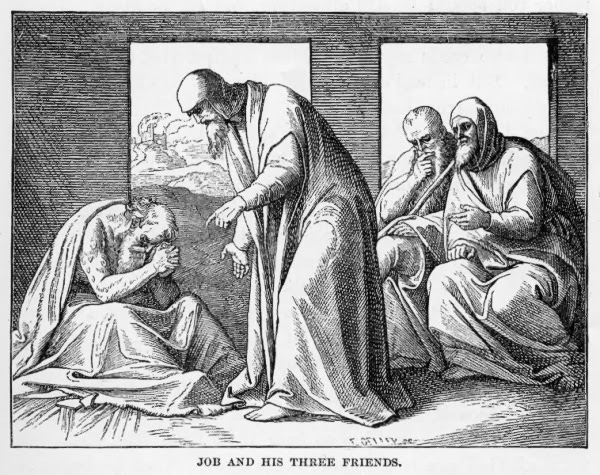Behemoth - Job 40:15-24
Leviathan - Job 41:1-34
 |
| Behemoth & Leviathan - Wm. Blake |
TO CHEW ON: "'Now prepare yourself like a man;
I will question you, and you shall answer Me.'" Job 40:7
Have you heard the saying, "You don't know what you don't know"? I've heard it quoted to writers who think their work is perfect just the way it is and needs no editing. But this little truism could also apply to life in general. It reminds us that there are a multitude of things about which we don't have a clue.
This is, in effect, what God says to Job in our reading today, along with "You can't do what you can't do." I love how Eugene Peterson puts it in The Message:
6-7 God addressed Job next from the eye of the storm, and this is what he said:“I have some more questions for you,
and I want straight answers.
8-14 “Do you presume to tell me what I’m doing wrong?
Are you calling me a sinner so you can be a saint?
Do you have an arm like my arm?
Can you shout in thunder the way I can?
Go ahead, show your stuff.
Let’s see what you’re made of, what you can do.
Unleash your outrage.
Target the arrogant and lay them flat.
Target the arrogant and bring them to their knees.
Stop the wicked in their tracks—make mincemeat of them!
Dig a mass grave and dump them in it—
faceless corpses in an unmarked grave.
I’ll gladly step aside and hand things over to you— you can surely save yourself with no help from me! - Job 40:6-14 MSG
I need—we all need to remind ourselves of God's comeback to Job here when we hear people criticizing Him for His mishandling of the earth and the people on it—indeed, when we ourselves question His goodness, His wisdom, His justice, His power… For we see only part of the picture. We have only limited information. And we're impotent to do much about what we do think we know and understand.
So what is our realistic stance here?
- Humility in admitting our limitations - Ecclesiastes 8:7; 9:12; 11:5.
- Repentance for our arrogance - Job 42:5,6.
- Prayer for God's help to be able to live wisely during the time and in the place God has set us - James 1:5-8
PRAYER: Dear God, please help me to face life realistically. I don't think You want me to throw up my hands in despair that I'm powerless. At the same time, You don't need my help and advice on how to run the world. Please help me to fulfill the destiny You have for me in humility and obedience as I trust You with the big picture. Amen.
PSALM TO PRAY: Psalm 146
*********
Unless otherwise noted all Scripture quotations are taken from the New King James Version®. Copyright © 1982 by Thomas Nelson, Inc. Used by permission. All rights reserved.



















